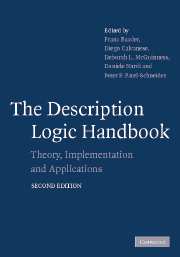Book contents
- Frontmatter
- Contents
- List of contributors
- Preface to the second edition
- Preface
- 1 An Introduction to Description Logics
- Part I Theory
- 2 Basic Description Logics
- 3 Complexity of Reasoning
- 4 Relationships with other Formalisms
- 5 Expressive Description Logics
- 6 Extensions to Description Logics
- Part II Implementation
- Part III Applications
- Appendix: Description Logic Terminology
- Bibliography
- Index
5 - Expressive Description Logics
Published online by Cambridge University Press: 06 July 2010
- Frontmatter
- Contents
- List of contributors
- Preface to the second edition
- Preface
- 1 An Introduction to Description Logics
- Part I Theory
- 2 Basic Description Logics
- 3 Complexity of Reasoning
- 4 Relationships with other Formalisms
- 5 Expressive Description Logics
- 6 Extensions to Description Logics
- Part II Implementation
- Part III Applications
- Appendix: Description Logic Terminology
- Bibliography
- Index
Summary
Abstract
This chapter covers extensions of the basic Description Logics introduced in Chapter 2 by very expressive constructs that require advanced reasoning techniques. In particular, we study reasoning in description logics that include general inclusion axioms, inverse roles, number restrictions, reflexive–transitive closure of roles, fixpoint constructs for recursive definitions, and relations of arbitrary arity. The chapter will also address reasoning w.r.t. knowledge bases including both a TBox and an ABox, and discuss more general ways to treat objects. Since the logics considered in the chapter lack the finite model property, finite model reasoning is of interest and will also be discussed. Finally, we mention several extensions to description logics that lead to undecidability, confirming that the expressive description logics considered in this chapter are close to the boundary between decidability and undecidability.
Introduction
Description Logics have been introduced with the goal of providing a formal reconstruction of frame systems and semantic networks. Initially, the research has concentrated on subsumption of concept expressions. However, for certain applications, it turns out that it is necessary to represent knowledge by means of inclusion axioms without limitation on cycles in the TBox. Therefore, recently there has been a strong interest in the problem of reasoning over knowledge bases of a general form. See Chapters 2, 3, and 4 for more details.
When reasoning over general knowledge bases, it is not possible to gain tractability by limiting the expressive power of the description logic, because the power of arbitrary inclusion axioms in the TBox alone leads to high complexity in the inference mechanisms.
- Type
- Chapter
- Information
- The Description Logic HandbookTheory, Implementation and Applications, pp. 193 - 236Publisher: Cambridge University PressPrint publication year: 2007
- 7
- Cited by



